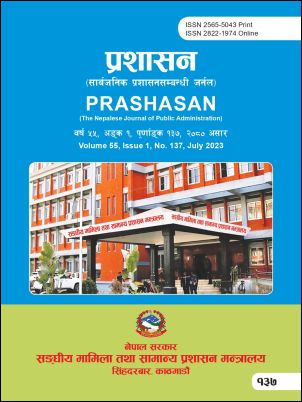Opportunities and Challenges in Bangladesh, Bhutan, India, and Nepal (BBIN) Initiative for Nepal
DOI:
https://doi.org/10.3126/prashasan.v55i1.56441Keywords:
Sub-regionalism, BBIN, Opportunities and Challenges, NepalAbstract
In simple term, sub-regionalism refers to cooperation and integration among a group of countries within a larger region. Over the past few years, there has been a shift towards sub-regional groupings within the larger multilateral, regional grouping. One such sub-regional grouping in South Asia is Bangladesh, Bhutan, India, and Nepal (BBIN). BBIN, formed in 2014, aims to foster greater cooperation among the member countries on various issues, including trade, transportation, energy, and the environment. The paper attempts to study how Nepal's participation in the BBIN can result in a much-needed resolution to Nepal's connectivity-related issues. The sub-regional cooperation promises to ease Nepal's connectivity issues and aid in the country's economic integration with the rest of the world. To reap these benefits, Nepal needs to be free from political issues and work on implementing high-priority infrastructure and connectivity projects. Nevertheless, Nepal should not be overly optimistic given its own capacity constraints on implementing big connectivity projects and the fact that such regional arrangements haven't offered Nepal with many benefits in the past.
Downloads
Downloads
Published
How to Cite
Issue
Section
License
- The copyright of published materials of the journal remains with Ministry of Federal Affairs and General Administration.
- The published article cannot be reproduced or copied commercially by any person or institution but it can be used non-commercially for academic, research and training purpose providing proper citation is given.




